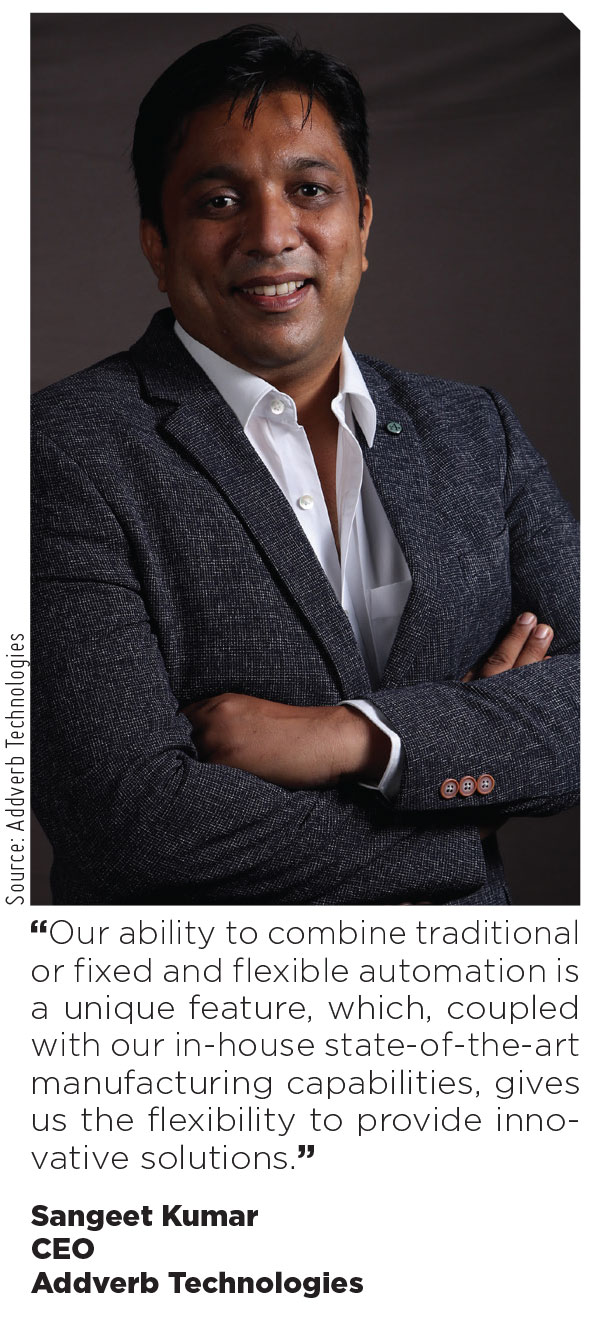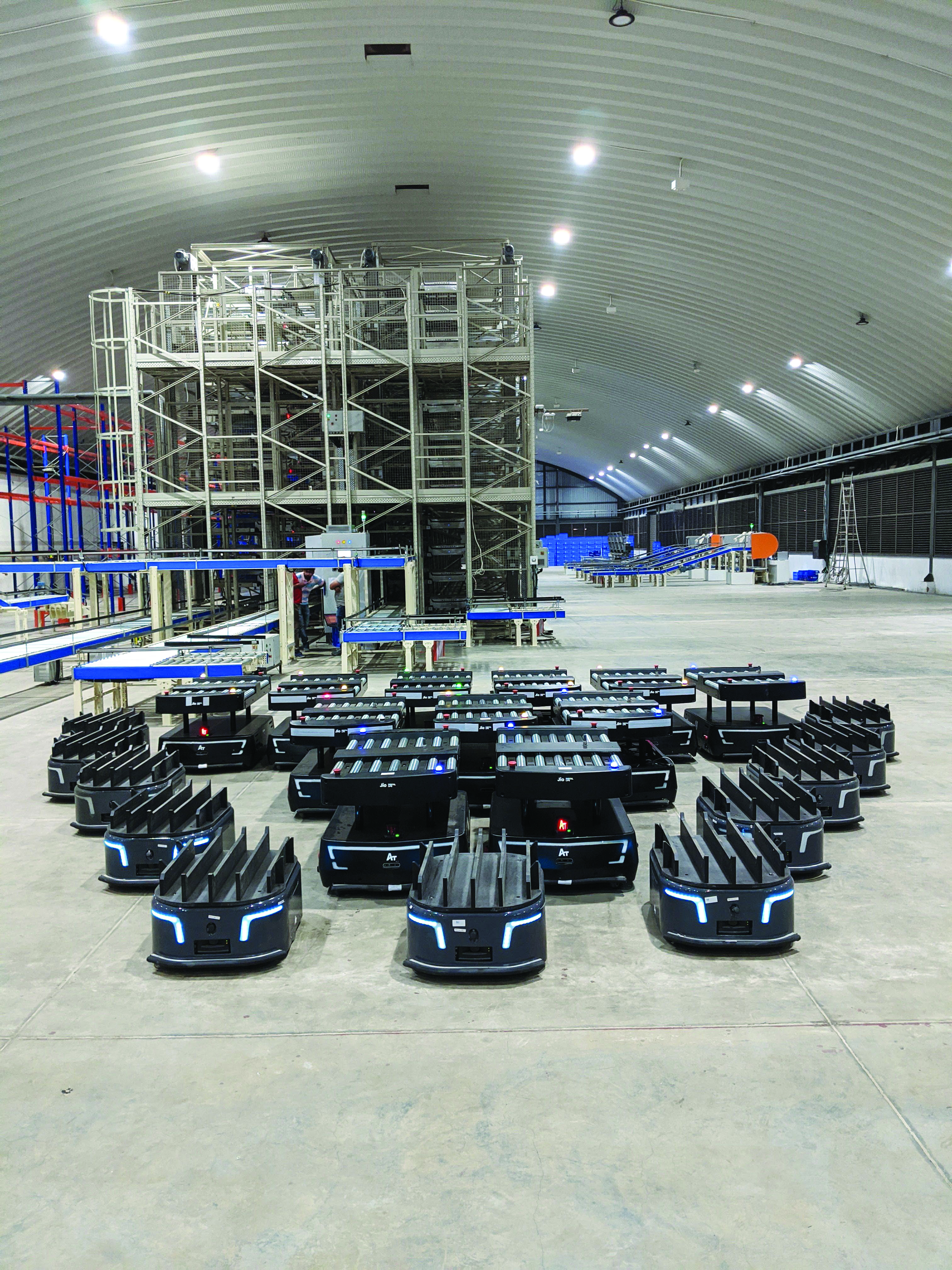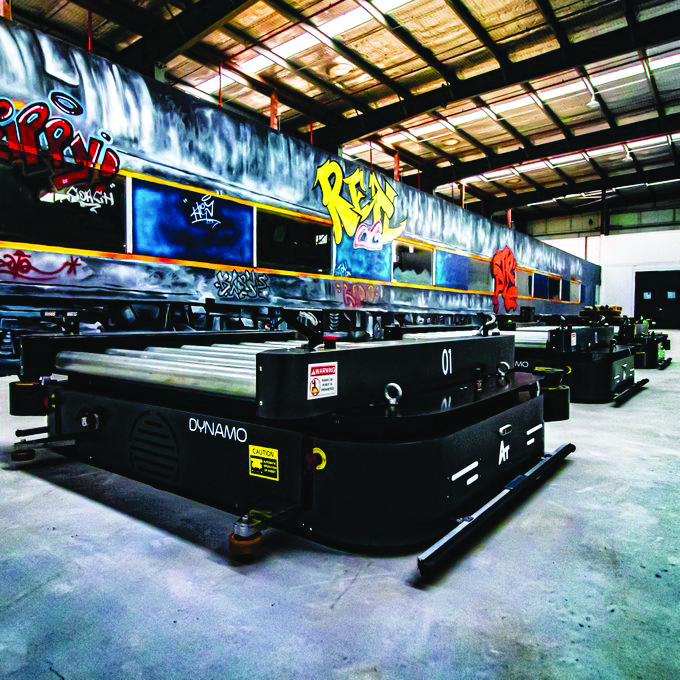A PIONEER IN ROBOTIC AUTOMATION

In just five years, Addverb Technologies has become a major player in the field of warehouse automation. Here’s knowing the company's remarkable journey and its disruptive plans for the future…
The Government of India wants the country to be a US$5 trillion economy by 2025-26, with the Manufacturing sector contributing US$1 trillion of it. This will be possible only when industries in India function at top gear, making full use of automation, robotics, and other latest technologies. Europe and America have been doing it, and so have some countries in Asia such as China, Japan, and Taiwan. India is doing it in a calibrated manner, but the pace needs to be increased if we want to meet the Government's aspirations. This is what Addverb is trying to achieve.
 According to Sangeet Kumar, CEO, Addverb Technologies, the company’s journey began when Kumar was working with the other co-founders - Prateek Jain, Bir Singh, Satish Shukla, and Amit Kumar - at Asian Paints. All of them were involved in setting up for the paint giant some of the most automated factories and warehouses in the world.
According to Sangeet Kumar, CEO, Addverb Technologies, the company’s journey began when Kumar was working with the other co-founders - Prateek Jain, Bir Singh, Satish Shukla, and Amit Kumar - at Asian Paints. All of them were involved in setting up for the paint giant some of the most automated factories and warehouses in the world.
Recollecting the market situation of 2016, Kumar says that at that time, most automation requirements were being met by companies based in Europe and the US. There were several challenges in installing and deploying these automation solutions in the Indian context, and there was a void with no major Indian player in the market segment.
Subsequent changes in the second half of the previous decade such as the implementation of GST, the rise of organized retail, the growth of e-commerce, and the push to 'Make in India' nudged the colleagues to start Addverb in June 2016. All of them had tremendous insights into the latest technologies and valuable experience in operating highly automated factories and warehouses. “We felt that we could create some unique product offerings by merging our knowledge of technology and operations,” Kumar recalls.
Exhaustive range of automation
Addverb Technologies had humble beginnings when it started in two rooms located at Tagore Garden in Delhi. As the team grew in size and business volumes increased, the company shifted its operations to Noida in 2018. It now has a brand-new facility called Bot-Valley in Noida.
Kumar says the company has come a long way and he can look back with some degree of satisfaction as it rose from a turnover of `1.5 crore in the first year to around `200 crore in the last financial year.
He explains that Addverb provides robotic automation for warehouses and fulfillment of operations. The company’s end-to-end product portfolio helps in the complete automation of warehouse processes. “Our products and services merge the information technology and operational technology and help us deliver innovative automation solutions that help businesses increase the throughput and accuracy of their operations and make the fulfillment operations highly reliable,” he states.
Since the startup designs, develops, and deploys its products, it is easier to incorporate any change as per the needs of the customer, thus giving the customer the flexibility to incorporate changes during the project implementation as well. “Our products and services can be categorized as robotics, ASRS, and software, which cover the entire range of automation,” he informs. These products and services help businesses to automate processes such as in-warding, put-away, order picking, material movement, order consolidation, sorting and packing.
Addverb’s software helps in controlling different automated equipment and in executing warehouse processes through automation. Its product line includes robots such as Dynamo (autonomous mobile robot), Zippy (sorting robot), Quadron (carton shuttle robot), Multi-Pro (ASRS), Cruiser (pallet shuttle robot), intelligent software like Mobinity (warehouse control system), Optimus (warehouse management system), and semi-automated systems like Rapido (pick-to-light) and Khushi (pick-by-voice), he shares.
Leveraging technologies
The automation expert uses a number of technologies to build products that help improve the performance and accuracy of warehouse and factory operations. Its products can be visualized as electro-mechanical devices controlled by intelligent software. As such, its products have elements of both hardware and software, and the company has a multi-disciplinary engineering team to cater to these requirements; it has more than 450 engineers, out of whom around 20 percent are dedicated to R&D.
"We use different technologies for different products, and also use technology extensively in our internal processes. This gives us a competitive advantage. For instance, we use industry-leading PLM software to deliver our products. We leverage complex design, simulation, and rendering software to develop the look and mechanical design of our products,” informs Kumar.
For the automation and control elements of the company’s products, it uses a digital twin. To crash project delivery timelines, it follows the practice of simulation and virtual commissioning, which helps it to anticipate and identify issues in projects before the physical installation takes place.
Addverb uses artificial intelligence and machine language in its software for solving task scheduling and order prioritization for customers in warehouses. Many of its offerings like WMS and WCS are cloud-based, which is a first in the industry.
Funding based on trust
More often than not, startups are prone to running into financial crises, but Addverb has had a smooth journey. "When we decided to exit Asian Paints and start Addverb, the first person we informed was Jalaj Dani, one of the promoters of Asian Paints. He was also the President of Asian Paints' supply chain, HR and international business at that time. He assured us of full support whenever we felt the need. He also invested US$11 million in Addverb over a period of two years,” shares Kumar.
The company has come a long way from a turnover of `1.5 crore in the first year to around `200 crore in the last financial year.
As all of them belonged to the same culture at Asian Paints and had worked with him for 12 long years, there was a certain level of trust. Dani knew their plans and believed in them. He was not only an investor, but also a mentor. “Both the investments that we have raised so far have primarily come from Jalaj Dani. GAIL also invested in us under its initiative, Pankh, which was launched under Startup India,” he adds.
The investment in terms of time and R&D came from their experience working with Asian Paints. “I would like to point out here that Jalaj Dani invested money in Addverb in his personal capacity, not on behalf of Asian Paints,” Kumar informs.
 Expanding amid competition
Expanding amid competition
Kumar believes that Indian companies have not really embraced technology for their supply chain and not automated their operations fully: “When we started, there were only a handful of automation players. All were foreign players including American, Japanese, Korean, Italian, German and British. But their products were typically not accustomed to the Indian conditions and had little scope for any customization as per the business requirements and operations in India, thus leading to a considerable ramp-up and commissioning time.”
This limited the adoption of automated solutions to a few large companies. These large companies were also reluctant to try out new solutions since they had faced challenges from the already installed solutions. Also, as these solutions were expensive, small and medium companies could not afford them.
He shares that the company’s initial days were filled with endless sessions with its customers. “Our approach has been to educate the customer about the benefits of automation. As Indian companies are scaling up, they are realizing the need for automation. At Addverb, we offer automation solutions that are flexible and affordable, leading to their wide-scale adoption,” he adds. The company has since been able to build a world-class team of engineers and has bagged more than 100 customers, including the likes of HUL, Marico, Reliance, Flipkart, and Amazon.
Addverb is now looking forward to expanding across the globe, especially South East Asia, the US, Europe, and Australia. It has established offices in Singapore, Australia, and the Netherlands, already deployed its solutions in projects located in Hong Kong and Singapore and is currently working on a project in Australia. It is soon to open an office in the US too.
“Our ability to combine traditional or fixed and flexible automation is a unique feature, which, coupled with our in-house state-of-the-art manufacturing capabilities, gives us the flexibility to provide innovative solutions,” he states.
“The robotics and warehouse automation field has got a tremendous push due to COVID-19. In India alone, the warehouse automation market will be worth more than `10,000 crore in the next five years.”
Automation in the time of COVID
The global pandemic has changed many things. Companies are constrained by inadequate manpower availability to manage their warehousing operations since many people have left for their hometowns due to lockdowns. To maintain adequate social distancing and ensure that their products are not touched by many people during warehousing operations, goods-to-person technologies such as mobile robots and carton shuttle robots have been picking up. These technologies ensure fast, productive, and reliable warehousing operations.
Another factor is the rise of micro fulfillment centers (MFCs), which are sprouting across the country to ensure low-cost, last-mile delivery of orders. MFCs can achieve their performance expectations through manual and automated solutions.

“The robotics and warehouse automation field has got a tremendous push due to COVID-19. In India alone, the warehouse automation market will be worth more than `10,000 crore in the next five years. The major players in the global market are Knapp, Dematic, Intelligrated, Vanderlande, Daifuku, and Schaeffer, to name a few. However, we have a wider product portfolio than our global peers, and our software suite is more powerful,” Kumar shares.
“Our journey till now has been highly exciting and fulfilling. We want to extend robotics to other industry verticals as well,” he adds summing up.

Poonam Pednekar
Chief Copy Editor
Magic Wand Media Inc
poonam.pednekar@magicwandmedia.in
Source: Addverb Technologies




 Facebook
Facebook.png) Twitter
Twitter Linkedin
Linkedin Subscribe
Subscribe